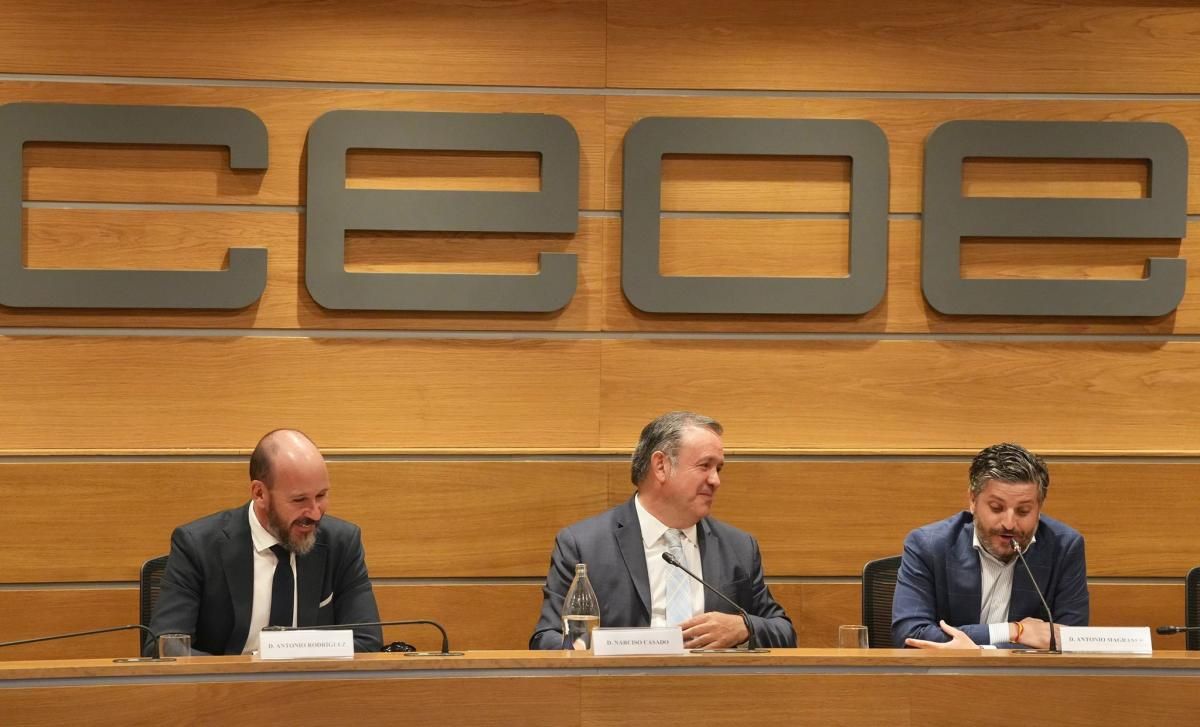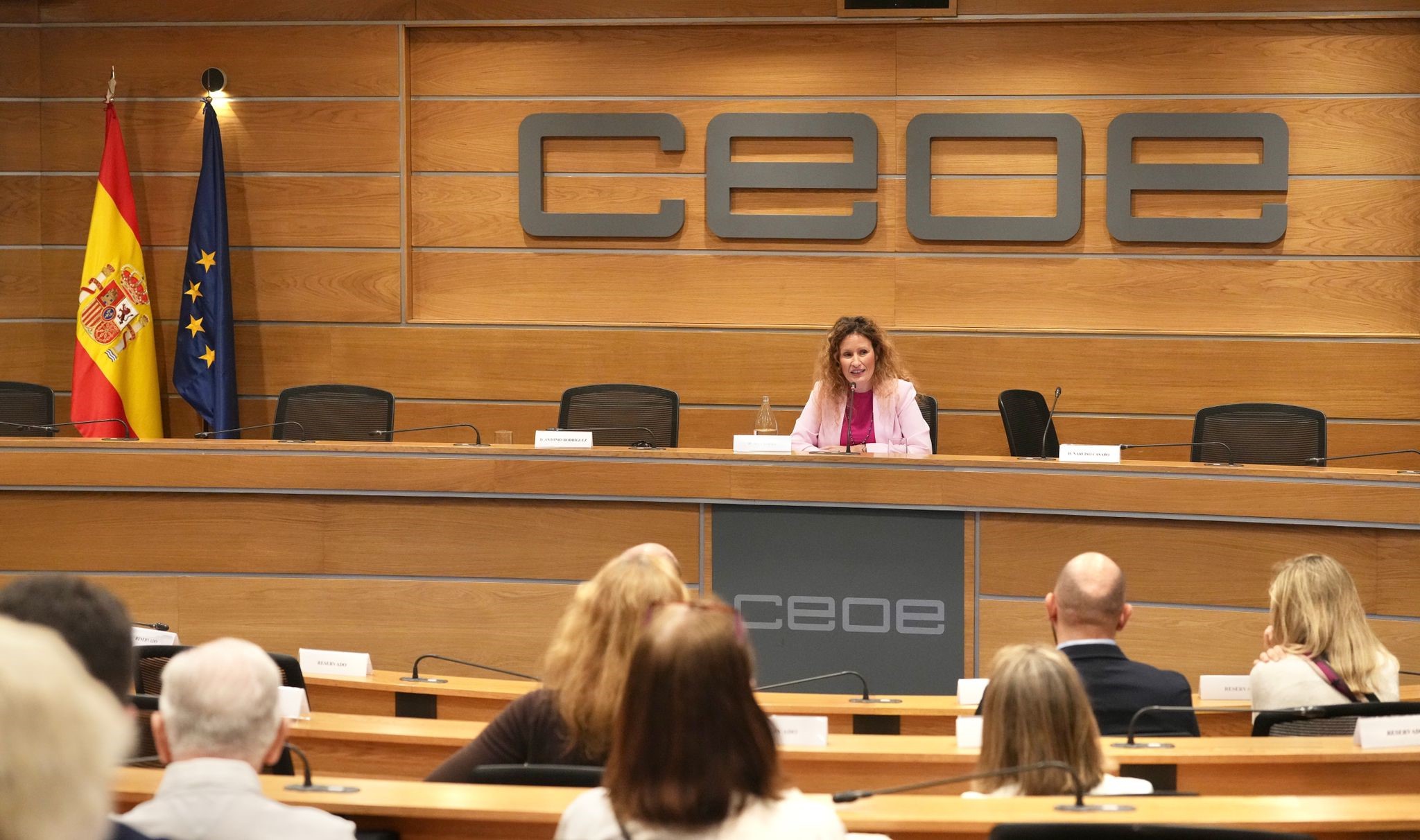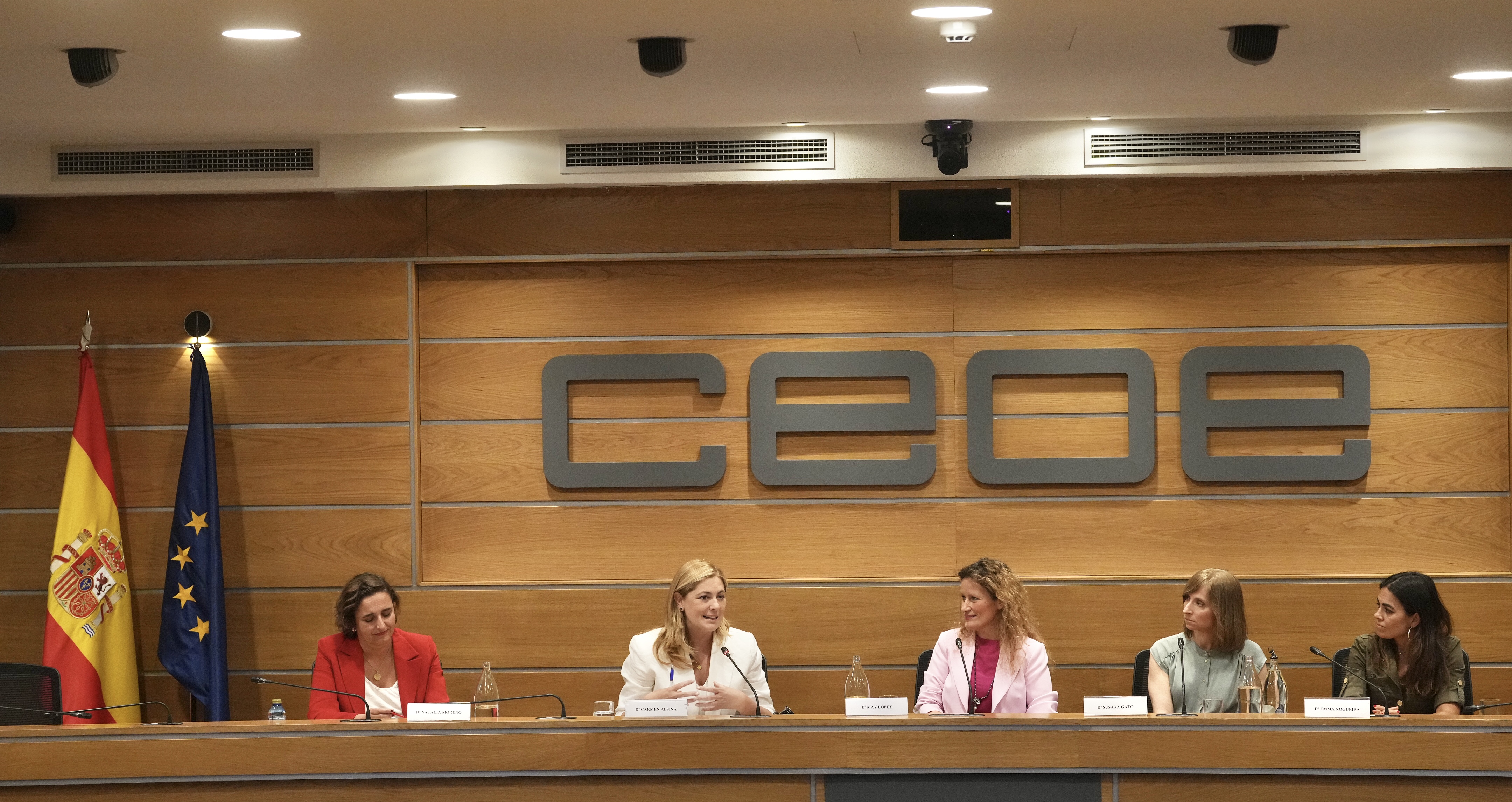CEIB, EAE Business School and FIJE present the 2nd Ibero-American Sustainability Observatory
40% of organisations have integrated the 2030 Agenda and the SDGs into their strategy and operations, 26% are in the process of doing so and 30% have not yet done so.

The conference was opened by the President of the CEOE, Antonio Garamendi and the Dean of EAE Business School, Antonio Rodríguez; and the report was presented by the Permanent Secretary of CEIB, Narciso Casado; the Secretary General of FIJE, Antonio Magraner; and the Director of Companies for Sustainable Mobility, Director of EAE’s MBA in Sustainability and author of the study, May López.
SDG 7 “Affordable and clean energy” climbs from 12th to 1st place, which is a priority for Ibero-American organisations because of the geopolitical situation.
There is a shift underway: large Ibero-American companies prioritise the need to leave a better legacy over looking after the planet and natural resources.
The President of the CEOE, Antonio Garamendi, and the Dean of EAE Business School Madrid, Antonio Rodríguez, opened a conference at the headquarters of the Business Confederation to present the 2nd Latin America Sustainability Observatory. The document highlights employers’ organisations’ sustainability actions and strategies and reflects companies’ general understanding of Corporate Social Responsibility (CSR), specific sustainability programmes or legislation associated with CSR. The report was introduced by the Permanent Secretary of CEIB, Narciso Casado and the Secretary General of FIJE, Antonio Magraner, and was presented by the Director of Companies for Sustainable Mobility, Director of the MBA in Sustainability at EAE and author of the study, May López. The report shows that large Latin American companies prioritise the need to leave a better legacy over looking after the planet and natural resources. In fact, 40% of organisations have integrated the 2030 Agenda and the SDGs into their strategy and operations, 26% are in the process of doing so and 30% have not yet done so.
The President of the CEOE, Antonio Garamendi, said that sustainability remains at the centre of the Ibero-American economies’ recovery policies, encompassing aspects such as innovation, digital transformation, creative economies and public-private partnerships. He also recalled that one of CEIB’s main goals is to bet on developing sustainable strategies and policies, aimed at developing the region economically, defending business interests and maintaining a permanent dialogue with Ibero-American institutions and governments.
The dean of EAE Business School Madrid, Antonio Rodríguez, said that companies are part of the school’s DNA, bearing in mind that they train many entrepreneurs who aspire to be managers, seeking to make this world a better world. And it is precisely in this environment, he pointed out, that the 2nd Ibero-American Sustainability Observatory was established. He also explained that the methodology they use is technically supported by PwC. Finally, he invited companies to collaborate in the following reports and to do their bit to continue supporting sustainability and corporate social responsibility.
2nd Ibero-American Sustainability Observatory
The report, prepared by CEIB, EAE Business School and FIJE, with the technical support of PwC, features the opinion of more than 300 companies and associations from 20 countries representing all sectors, and seeks to offer greater insight into the current situation and trends in CSR in companies. Thus, only 14% of Ibero-American companies spend more than 1% of their revenue on sustainability.
The research shows that, at present, CSR is strongly marked by a concern for the environment (40.1%), ethics (38.8%) and integrity (26.9%) in organisations, across large companies, associations and SMEs. Thus, Climate Change (24.5%) and the Economic Crisis (24.5%) are ranked as the main challenges for Ibero-American organisations in the coming years, with large companies being the most concerned about leaving a better legacy as regards looking after the planet and natural resources. In third place is cybersecurity (20.4%), rounding out the 3Cs, reflecting the growing concern with protecting companies’ data and information.
Geographically, the study also distinguishes between a greater preference for global implementation of CSR plans in countries located iEuropean countries, that is, Spain, Portugal and Andorra, where 74.4% of CSR plans are applied, compared to 47.40% in countries located in the Americas. This difference is partly due to the setting of standards by the European Commission that affect EU companies to a greater extent but which involve their entire value chain.
SDG and ESG at the Heart of CSR Strategy and Maturity
The Permanent Secretary of CEIB said that both the 24 business organisations in the Council and the 17 organisations in FIJE “have spoken as one to raise regional awareness, thus demonstrating our commitment to sustainability and CSR, a concept that is becoming maturer, and which we have been able to progressively integrate into our roadmap.” One of the facets, according to Casado, in which he believes success is becoming apparent, is in the circulation of information between various organisations about good practices in some countries and about the problems faced by others, always with a large dose of experience-based business pedagogy.
Informality in the labour sector, its relationship with social security systems, low productivity, the need to improve infrastructures and the region’s dependence on imports (especially in technology), are among the shared challenges facing organisations, and on which we work continuously to overcome the region’s inequalities, and guarantee its companies’ competitiveness, innovation and survival. “We also foster other concepts such as high-impact investments that reach the entire population equally; green, sustainable and inclusive investments; and new innovative business models that make employment the best formula for social inclusion,” he stressed.
In turn, the Secretary General of FIJE, Antonio Magraner, stressed that the Organisation saw a clear opportunity to collaborate on the report, since if anything characterises young people in the 21st century, it is the need to generate an impact, promote sustainability, the SDGs, corporate social responsibility and, above all, to bet on partnerships. “We are working to make Ibero-America more and better: more prosperous and inclusive, in both the public and private sectors. We cannot drive and offer initiatives without leading by example,” he stressed. In his opinion, what we stand for and work towards today will be what future generations will inherit, and that is why it is essential to be united as a region, and also with the rest of the world. “This report will be the first of many we will prepare together,” Magraner said.

The 2nd Observatory highlights the prominence of the 2030 Agenda and the Sustainable Development Goals (SDGs), which have been integrated into the strategy of 40% of the organisations surveyed. Of the remainder, 26% say they are in the process of doing so and 30% have not yet done so. In this respect, in Europe this integration is taking place in 84% of companies, compared to 63% in the Americas. Incorporating the SDGs goes hand in hand with establishing ESG (Environmental, Social and Governance) criteria, whereby 70.1% of Ibero-American companies have already integrated them (39.5%) or are in the process of doing so (30.3%) and which allow the impact and development of the organisation in this area to be measured.
According to the 2nd Observatory, 3 of 4 organisations surveyed (75.4%) agree that CSR will become consolidated as a natural way of doing business, in the same way that other functions such as quality have.
The author of the study, May López, reported that the commitment to climate neutrality and hence to decarbonising the economy, with regulations such as the taxonomy regulation, has led to the disinvestment in oil, gas and coal and the start of energy speculation, reinforced by the current war in Ukraine. This situation has an impact on Ibero-American organisations, which has led them to identify SDG 7 as one of the key global goals to be prioritised. After affordable and clean energy, gender equality, health and well-being are two more United Nations Sustainable Development Goals (SDGs) that organisations prioritise, she said.
“For the first time in history, we are experiencing a sustainability crisis and we are facing many challenges, and we risk not addressing this situation in a coherent, efficient and coordinated manner,” explained López, the author of the study and Director of the MBA Sustainability Management at EAE Business School. “This crisis, besides being a challenge, is an opportunity to irreversibly integrate CSR and sustainability strategies into all types of organisations, thus contributing to the economic, social and environmental recovery that the different stakeholders demand of us,” said López.
In this respect, the research reveals that knowing and meeting stakeholder expectations to offer a balanced value proposition for everyone has become the most important aim for 52% of Latin American organisations. In this regard, the ‘Environment’ (14.9%), ‘Society’ (14.5%) and ‘Customers’ (14.2%) stakeholders are the most prominent among companies, closely followed by ‘Governance’ (13.9%) and ‘Employees’ (13.8%). There are also differences between the continents, whereby the larger the size and location in Europe, the more prominence companies give to ‘Environment’. SMEs and companies located in America are more concerned about ‘Employees’.
CSR: increased specialisation and prominence
According to the report, the cross-cutting nature and strategic importance of sustainability matters has highlighted the need to hire a sustainability director or professional (DIRSE), who currently reports mainly to the General Management, the Presidency or the Board of Directors. In recent years, a transition has been observed from “soft law to hard law” in terms of sustainability, mainly due to new legislation from the European Union and its rigidity, which reinforces the role of DIRSE. This transition is reflected in the fact that one in four Latin American organisations now has a dedicated CSR department. This percentage has risen from 82.9% to 90% over the last two years in the case of large Latin American companies with a turnover of more than one trillion dollars.
Sustainability and CSR initiatives
The presentation of the report was closed with a round table discussion moderated by the author of the study and Director of the MBA Sustainability Management at EAE Business School, May López, and featured the Director of Communication, Institutional Relations and Sustainability at the CEOE and Secretary of the CSR Commission of the Organisation, Carmen Alsina; the Director of Strategy and Business Development at the Bosch Group for Spain and Portugal, Emma Nogueira; the Global Director of Institutional Relations at Telefónica, Natalia Moreno; and the Director of Corporate Responsibility at ATRESMEDIA and Deputy Director of the ATRESMEDIA Foundation, Susana Gato.

The four speakers on this panel agreed as to the importance of raising awareness of sustainability and SDGs, as well as of promoting training, a sustainable corporate culture and building a greener future together. They also insisted on the leading role of the private sector in this process and the need to report on and disseminate information about the initiatives, proposals and programmes being implemented, to encourage companies not to be left behind, while always taking a long-term view.
Thus, Susana Gato said that the SDGs are a great guide and show us the path we must follow. ATRESMEDIA has therefore attempted to raise awareness among millions of people using content and information. According to Gato, they have lent a voice to equality, created a specific section on SDGs and trained and raised awareness among their employees regarding the need to be more sustainable. To continue on this path, it is important to “promote resilience, assertiveness, teamwork and soft skills”.
For her part, Emma Nogueira said that for Bosch, sustainability is not a priority but an obligation. She reported that they have achieved carbon neutrality at 400 locations, of which there are 56 plants in Latin America. The aim now is to focus on improving energy efficiency throughout the supply chain. “We demand the same from suppliers as we do from ourselves,” he said. Nogueira also explained that the company has paid special attention to other areas, such as water, health, climate, diversity and inclusion. The aim is to be able to improve people’s quality of life and, to do so, they have developed products to improve measurement of air quality in smart cities. “It is crucial constantly to listen to stakeholders and see what they are hoping for,” he said.
Natalia Moreno, in turn, stressed that to integrate sustainability in Telefónica, they do it with a purpose, assessing where they can contribute more. They have therefore invested more than 4 billion in infrastructure and have affected other sectors such as education, equality, diversity and inclusion. On the other hand, she reported that Telefónica has helped customers to make the energy transition, given that it collaborates with more than 9,000 suppliers, most of them SMEs. “The green transition will be impossible without technology and digitalisation,” he said; and he talked about the importance of setting key objectives and pursuing them, to be able to lead by example. Finally, he explained that, in the field of energy, they are betting on producing, using and storing green hydrogen; and, if alliances are established between companies and associations, it may be a very valid, practical and profitable source of energy.
Finally, Carmen Alsina emphasised that the CEOE has given greater impetus to the field of sustainability since Antonio Garamendi’s presidency began. At first it was a disruptive process, he said, before a dissemination process began, extolling the private sector’s leadership role and raising awareness among companies. Moreover, the CEOE’s CSR Committee was reactivated, and a collaboration agreement was signed in 2019 with the Spanish Global Compact Network, to work on disseminating and promoting the SDGs in Spanish business organisations and in the private sector. Alsina also stressed the importance of alliances in this process the fact that, in the case of the CEOE, they remain in place with both CEIB and FIJE to work in the Ibero-American area. “We must not only focus on the present; rather, we must have a very long-term vision and act as a guide and umbrella for the other associations and companies. Thus, it is worth highlighting our role as weavers of alliances by means of dialogue at the tables of government, to build a better future,” concluded Alsina.
Related news
A large delegation made up of Spanish business organisations and companies took part this Monday and Tuesday, 9 and 10 September, in two high-level meetings with representatives of the Chinese business world, as part of the official visit of the President of the Government, Pedro Sánchez, to the People's Republic of China.
Even though China is our main trading partner in Asia, Spanish companies still have a long way to go to take advantage of the great business and investment opportunities offered by the Chinese market.
The Ibero-American Secretary General, Andrés Allamand; the President of the CEOE, Antonio Garamendi, and the President of the Ibero-American Arbitration Centre-CIAR, Javier Íscar, inaugurate a conference at the CEOE on Ibero-American arbitration. They stress the importance of continuing to support arbitration as an effective and safe instrument for resolving disputes in the region.
Business and investment opportunities in Medellin and the Metropolitan Area were assessed for the Spanish companies with interests in the area.






